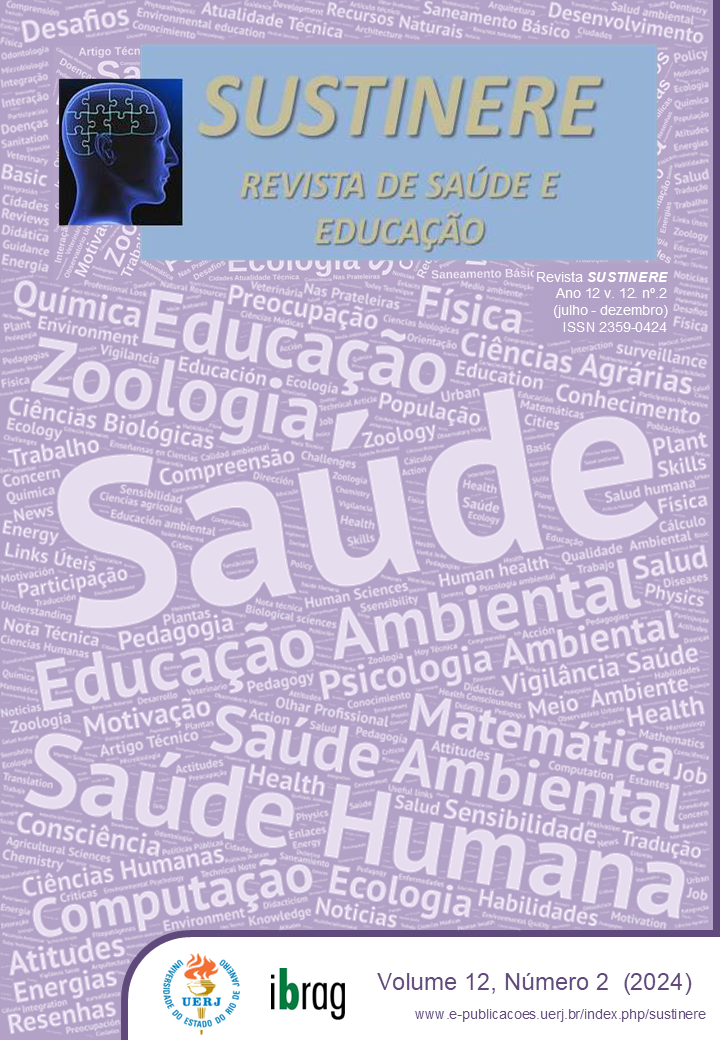Salud 4.0, tecnologías emergentes y escenarios disruptivos en entornos hospitalarios: una revisión del alcance
DOI:
https://doi.org/10.12957/sustinere.2024.84050Palabras clave:
Salud 4.0, Cuarta revolución industrial, Tecnologías sanitarias, Tecnologías emergentes, Entornos hospitalariosResumen
Considerada una nueva etapa del desarrollo humano, impulsada por un conjunto de tecnologías desarrolladas a partir de las tres revoluciones anteriores, la Cuarta Revolución Industrial, o Industria 4.0, se basa en la fusión de tecnologías y la interacción entre entornos físicos, digitales y biológicos. Muchos sectores se están modificando, y en el caso concreto de todo lo relacionado con la salud aparece el término Salud 4.0. Cuando las tecnologías se crean, evolucionan e incorporan a los sistemas de salud, impactan en varias áreas, incluida la planificación arquitectónica del medio ambiente. De esta manera, este estudio pretende contextualizar el escenario actual de Salud 4.0, mapeando las tecnologías emergentes como oportunidades para optimizar sistemas complejos, como los del sector salud, identificando sus relaciones y posibles impactos en el entorno construido hospitalario. Para ello, se realizó una revisión de alcance en las bases de datos Google Scholar, IEEE Xplore, PubMed, SciELO, Scopus y Web of Science, con el objetivo de brindar un panorama de las investigaciones sobre el tema, donde se identificaron: de Salud 4.0, desafíos, soluciones y oportunidades, beneficios, tecnologías y características del entorno físico. Se constató que la literatura sobre el tema es escasa, destacándose la falta de estudios y la existencia de un campo aún en construcción.
Citas
AHMAD, K. A. B. et al. Emerging trends and evolutions for smart city healthcare systems. Sustainable Cities and Society, v. 80, maio 2022. DOI: https://doi.org/10.1016/j.scs.2022.103695. Acesso em: 28 abr. 2023.
AL-JAROODI, J. et al. Healthcare 4.0 - Managing a Holistic Transformation. In: IEEE INTERNATIONAL SYSTEMS CONFERENCE (SYSCON), 2022, Montreal. Anais... Montreal: IEEE, 2022. DOI: <https://doi.org/10.1109/SysCon53536.2022.9773863>. Acesso em: 02 abr. 2023.
AL-JAROODI, J.; MOHAMED, N.; ABUKHOUSA, E. Health 4.0: On the Way to Realizing the Healthcare of the Future. IEEE Access, v. 8, p. 211189–211210, nov. 2020. DOI: <https://doi.org/10.1109/ACCESS.2020.3038858>. Acesso em: 02 abr. 2023.
ALMEIDA, P. S. Indústria 4.0: princípios básicos, aplicabilidade e implantação na área industrial. São Paulo: Érica, 2019.
BAUSE, M. et al. Design for Health 4.0: Exploration of a new area. In: PROCEEDINGS OF THE 22ND INTERNATIONAL CONFERENCE ON ENGINEERING DESIGN (ICED19), 2019, Delft. Anais... Delft: Cambridge University Press, 2019. p. 887-896. DOI: <https://doi.org/10.1017/dsi.2019.93>. Acesso em: 02 abr. 2023.
GUPTA, A.; SINGH, A. Healthcare 4.0: recent advancements and futuristic research directions. Wireless Personal Communications, p. 933-952, 2022. DOI: <https://doi.org/10.1007/s11277-022-10164-8>. Acesso em: 02 abr. 2023.
KITCHENHAM, B. Guidelines for performing Systematic Literature Reviews in Software Engineering (EBSE Tecnical Report/EBSE 2007-01). UK: Keele University, 2007. Disponível em: <https://www.elsevier.com/__data/promis_misc/525444systematicreviewsguide.pdf>. Acesso em: 05 mar. 2023.
LHOTSKA, L. Application of Industry 4.0 Concept to Health Care. Studies in Health Technology and Informatics, v. 273, p. 23-37, set. 2020. DOI: <http://doi.org/10.3233/SHTI200613>. Acesso em: 02 abr. 2023.
LOPES J. M. et al. Health 4.0: Challenges for an Orderly and Inclusive Innovation [Commentary]. IEEE Technology and Society Magazine, v. 38, n. 3, p. 17-19, set. 2019. DOI: <https://doi.org/10.1109/MTS.2019.2930265>. Acesso em: 02 abr. 2023.
MACEDO, D. D. J.; MARTINS, P. R.; TOURINHO, F. S. V. A evolução no desenvolvimento de Tecnologias e a Saúde 4.0: disrupção do novo. In: TOURINHO, F. S. V. (org.). Desenvolvimento de tecnologias em pesquisa e saúde: da teoria à prática. [S.l.]: Editora Científica Digital, 2022, cap. 1. DOI: <https://dx.doi.org/10.37885/220408586>. Acesso em: 02 abr. 2023.
MOHAMED, N.; AL-JAROODI, J. The impact of industry 4.0 on healthcare system engineering. In: IEEE INTERNATIONAL SYSTEMS CONFERENCE (SYSCON), 2019, Orlando. Anais... Orlando: IEEE, 2019. DOI: <https://doi.org/10.1109/SYSCON.2019.8836715>. Acesso em: 02 abr. 2023.
PAUL, S. et al. Industry 4.0 Applications for Medical/Healthcare Services. Journal of Sensor and Actuator Networks, v. 10, n. 43, 2021. DOI: <https://doi.org/10.3390/jsan10030043>. Acesso em: 08 ago. 2022.
ROSA, V. et al. Digital technologies: An exploratory study of their role in the resilience of healthcare services. Applied Ergonomics, v. 97, nov. 2021. DOI: <https://doi.org/10.1016/j.apergo.2021.103517>. Acesso em: 02 abr. 2023.
SCHWAB, K. A quarta revolução industrial. Tradução: Daniel Moreira Miranda. São Paulo: Edipro, 2016.
SCHWAB, K; DAVIS, N. Aplicando a quarta revolução industrial. Tradução: Daniel Moreira Miranda. São Paulo: Edipro, 2018.
SONY, M.; ANTONY, J.; MCDERMOTT, O. The impact of healthcare 4.0 on the healthcare service quality: a systematic literature review. Hospital Topics, p. 1-17, 2022. DOI: <https://doi.org/10.1080/00185868.2022.2048220>. Acesso em: 02 abr. 2023.
STEVAN JR, S. L.; LEME, M. O.; SANTOS, M. M. D. Indústria 4.0: fundamentos, perspectivas e aplicações. São Paulo: Érica, 2018.
TORTORELLA, G. L. et al. Effects of contingencies on healthcare 4.0 technologies adoption and barriers in emerging economies. Technological Forecasting and Social Change, v. 156, jul. 2020. DOI: <https://doi.org/10.1016/j.techfore.2020.120048>. Acesso em: 02 abr. 2023.
TORTORELLA, G. L. et al. Healthcare costs’ reduction through the integration of Healthcare 4.0 technologies in developing economies. Total Quality Management and Business Excellence, v. 33, n. 3-4, p. 467-487, 2022. DOI: <https://doi.org/10.1080/14783363.2020.1861934>. Acesso em: 02 abr. 2023.
TRANFIELD, D.; DENYER, D.; SMART, P. Towards a Methodology for Developing Evidence-Informed Management Knowledge by Means of Systematic Review. British Journal of Management, v. 14, n. 3, p. 207-222, 2003. DOI: <https://doi.org/10.1111/1467-8551.00375>. Acesso em: 05 mar. 2023.
WEHDE, M. Healthcare 4.0. IEEE Engineering Management Review, v. 47, n. 3, p. 24-28, set. 2019. DOI: http://dx.doi.org/10.1109/emr.2019.2930702. Acesso em: 2 abr. 2023.
Descargas
Publicado
Cómo citar
Número
Sección
Licencia
Derechos de autor 2024 Revista Sustinere

Esta obra está bajo una licencia internacional Creative Commons Atribución 4.0.
Los derechos de autor de los artículos publicados en la revista pertenecen a Revista SUSTINERE de su (s) en cuestión (s) autor (s), con primeros derechos de publicación otorgados a la Revista SUSTINERE.
Los artículos publicados son de acceso público, de uso gratuito, con la asignación obligatoria de autoría original, de acuerdo con el modelo de licencia Creative Commons 4.0, aprobada por la revista.






